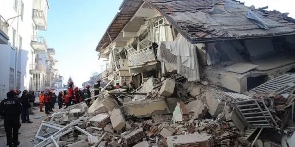 Earthquake rubble in affected cities: Photo courtesy Anadolu Agency
Earthquake rubble in affected cities: Photo courtesy Anadolu Agency
In the wake of the 7.8 magnitude earthquake that occurred in Turkey and Syria, while searching continues for further survivors in the communities hit since Monday of the event, Ghanaians and people around the world are still praying to see their citizens and family members, including Christian Astu.
Last night, Astu's agent left London and arrived in Turkey early this morning, " have met Hatayspor FC club officials, but the situation remains the same, Astu is yet to be found."
Three victims have been pulled alive from the rubble of Astu's building by the rescue team, and the search is still going on for more survivors, according to trustworthy sources close to Hatayspor FC, who verified this to me this evening.
Given the prior earth tremor that happened in Ghana on few occasions, what lessons have the government and people of Ghana learned from this current situation in Turkey and Syria?
Ghana has had to struggle to deal with "lesser disasters" amidst of inadequate resources for the National Disaster Management Organisation to swiftly respond to disasters in the country to protect against loss of life and damage to properties.
More survivors have been trapped in the rubble since Monday, and all of the nearby hospital facilities have been destroyed. Speaking to Ghanaian Journalist Vince Owusu-Appiah in London, Dr.John Gyasi Banin, Director of Accident and Emergency at the AngloGold Ashanti Health Foundation in Ghana, explained, "When there's a tremor, as has happened in Turkey the mortalities have three modules that occur and three periods during which most deaths would occur.
"The first is the immediate period, which is the seconds to minutes after the event, and during that time the patient usually suffers unpreventable injuries. "Sometimes they have a high spinal cord or brain injury as a result of major blood vessels, and then the patients usually pass on."
"The early deaths occur minutes after the injury because of bleeding. Most health professionals usually do much to change the cause of their outcome, and during that time the injuries that they suffer are treatable injuries which can be chest, head and abdominal injuries which might not be so serious."
"And the third module distribution is the late deaths, and which occurs days to weeks after the injuries, as a result of multiple organ systems in the body failing to function as they should, or the patients starting to develop infections through the injury they may have sustained, and if any health professionals have access to the patients and are able to make them in the early period after the injury, lives can be saved from the late deaths."
"Where victims are in the rubble for a number of days, and as time goes on, the chances of providing any medical care to help the victim survive also go down. As the person is trapped, they are not given water or food and considering the weather climate, and without the protection of a building and adequate cloth covering, they're exposed to the weather temperature, so they can develop hypothermia, and all these may compound the injuries they may have sustained.
The longer the injury lingers on, the lower the chances are to be rescued, or if survival also goes down; it is not that a certain number of days passes; it is not a hundred percent that they will die."
"The human body has a mechanism to protect itself and also help it survive in very harsh conditions." "If someone suffers an injury to a thigh bone and they are bleeding into the thigh, that person's chances of survival may not be the same as those of another person who has just been trapped but has not been injured."